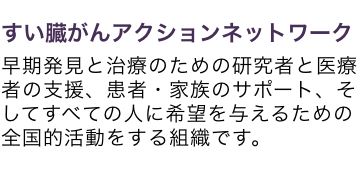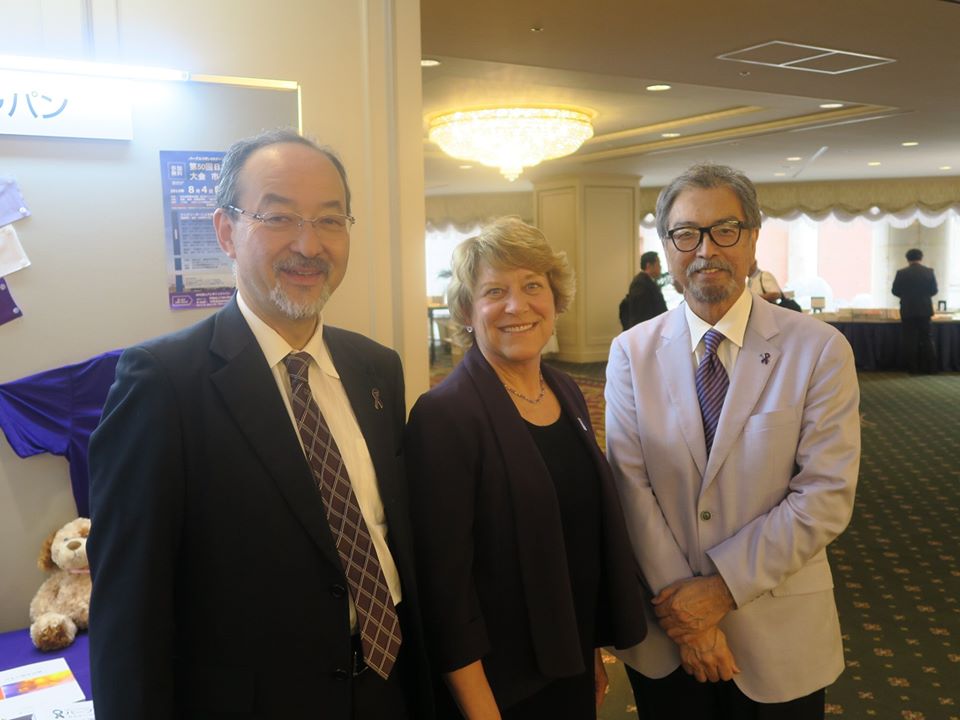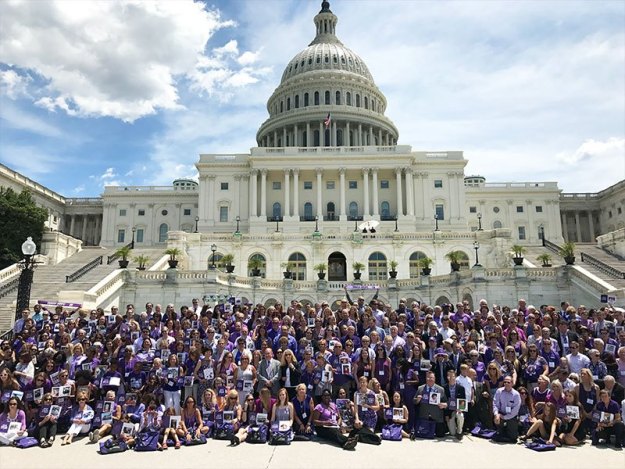海外ニュース:パンキャン本部による研究関連ニュース(英語版)
July 2017
PANCREATIC CANCER ACTION NETWORK AND COMMUNITY NEWS
Pancreatic Cancer Action Network news:
Progress Begins Here – Announcing the 2017 Research Grantees
2017 Research Grant Recipients
We are thrilled to announce our 2017 research grants recipients. In collaboration with generous donors, the Pancreatic Cancer Action Network (PanCAN) is investing an estimated $4.9 million in vital pancreatic cancer research through its competitive peer-reviewed 2017 Research Grants Program – including 17 grants to 21 researchers at 12 institutions across the country.
Cancer Progress Spotlighted in the News
In early June, nearly 40,000 clinical oncologists, cancer researchers and other healthcare and industry professionals convened in Chicago for the American Society of Clinical Oncology (ASCO) Annual Meeting – the world’s largest clinical oncology meeting. On June 16, an article was published
in Parade that highlights celebration-worthy announcements from this year’s ASCO meeting.
Hundreds of ‘Purple People’ Step Up, Stand Tall, Act Boldly on Capitol Hill
Our nation’s capital was covered in purple on Tuesday, June 20, on the 10th anniversary of National Pancreatic Cancer Advocacy Day. That’s because more than 650 passionate advocates, including more than 100 pancreatic cancer survivors, were on Capitol Hill to urge their members of Congress to make cancer research a national priority. All 50 states were represented, and thousands more from every state called their senators and representative to echo that same message. Take a look at a few highlights from the historic event.
U.S. Congressional Leaders Wage Hope Together to Support Pancreatic Cancer Research
On June 20, congressional leaders came together with bipartisan support for cancer research during the Pancreatic Cancer Action Network’s 10th annual Advocacy Day in Washington D.C.
Medscape Highlights Pancreatic Cancer and Precision PromiseSM in Recent Feature
Medscape published a feature story detailing the science behind pancreatic cancer. The article recounts the devastating statistics of the disease and highlights the advancements being made despite many challenges. At the heart of the article is PanCAN’s revolutionary Precision PromiseSM initiative that is bringing together integral members of the pancreatic cancer community to accelerate research progress for the disease.
Why a Pancreatic Cancer Call Center?
A recent NPR piece highlighted an important topic: cancer call centers. Patients diagnosed with cancer need a lot of information and have many decisions ahead of them. Call centers, like the one featured in the piece and the Pancreatic Cancer Action Network’s Patient Central, provide patients and their families a place to have their questions answered outside the doctor’s office.
PanCAN Featured in the Harvard Business Review
we were featured in the Harvard Business Review for our role in the novel HBS Kraft PM
Accelerator initiative. The Accelerator’s mission is to speed medical breakthroughs in precision medicine, the process by which genomic information and other unique characteristics of a person’s disease are used to predict which treatments will be most effective. Four paths have been identified toward Acceleration across all cancers: direct-to-patient, data and analytics, rational clinical trial design, and investment/venture capital.
Clinical Trial Finder
The Clinical Trial Finder saves you time and energy by helping you quickly and easily find the most current pancreatic cancer clinical trials information. By registering for an account, you will have access to the most up-to-date and comprehensive database of pancreatic cancer clinical trials in the United States. Our online tool allows you to perform a patient-specific search to locate available trials based on your patients’ needs or a general search to understand the current clinical trials landscape to inform research or trial design.
Know Your Tumor® Powerful Knowledge. Personal Treatment.®
Our Know Your Tumor service is an IRB-approved protocol that provides you and your pancreatic cancer patients with a molecular profiling report of their tumor, which includes personalized treatment options – including standard treatments, off-label treatments and available clinical trials. Treatment options are determined after findings of the molecular reports are interpreted by an expert panel, providing valuable insight to support your treatment decisions.
Patient Registry
The Patient Registry is a global online database created to look for patterns in treatments, side effect management and diagnostics that will lead to improved treatment options and outcomes for patients. Whether you have been diagnosed with pancreatic cancer or have provided care for someone with pancreatic cancer, your contributions are meaningful. By joining our quickly growing community and sharing your experiences, you’re giving researchers access to crucial data that will help make discoveries. Together, we will move pancreatic cancer research forward.
Funding opportunities:
New! Lustgarten Foundation Research Investigator Awards Program
Letters of Intent due: August 11, 2017
Program goal is to identify and fund significant researchers and research projects that are focused on basic pancreatic cancer biology and will impact early diagnosis, improved and effective therapy, and ultimately a cure for pancreatic cancer.
New! Lustgarten Foundation Research Translational Clinical Program
Letters of Intent due: August 11, 2017
Program goal is to identify and fund new, innovative translational research projects that will significantly impact early diagnosis, increased surgical intervention, improved and effective therapies or personalized medicine and ultimately a cure for pancreatic cancer.
AACR Scientific Achievement Awards and Lectureships
Nominations due between August 2 – 23, 2017
The esteemed AACR Scientific Achievement Awards Program honors researchers through 16 prestigious awards for their global impact on cancer research. They encourage scientists who are now or have been affiliated with any cancer research institution to nominate a deserving colleague. Nominations for
the award program are now open.
American Gastroenterological Association Funding
Applications due: August 4, 2017 through 2018
The AGA Research Foundation provides over $2 million annually to spur discoveries in gastroenterology and hepatology.
NIH Director's New Innovator Award Program
Earliest submission date: August 8, 2017
Application due date: September 8, 2017
The NIH Director’s New Innovator Award (DP2)
supports a small number of early stage investigators of exceptional creativity who propose bold and highly innovative new research approaches that have the potential to produce a major impact on broad, important problems in biomedical and behavioral research.
Stand Up To Cancer Announces Open Call for Ideas for $10 Million Dream Team of Top Investigators
Letters of Intent due: September 5, 2017
Stand Up To Cancer (SU2C)
Stand Up To Cancer (SU2C) is inviting proposals for a new $10 million Dream Team of top scientific investigators searching for new strategies to prevent or treat cancer, the American Association for Cancer Research (AACR), SU2C’s Scientific Partner, announced. Unlike other Dream Team grants offered by SU2C in recent years that focused on specific types of cancer, such as colorectal cancer or lung cancer, the new $10 million grant is open to any type of translational cancer research.
The Pancreatic Cancer Detection Consortium (U01)
Deadlines: September 21, 2017; April 6, 2018
This Funding Opportunity Announcement (FOA) invites applications from multi-disciplinary teams of researchers and clinicians to establish the Pancreatic Cancer Detection Consortium (PCDC) to conduct research to improve the detection of early stage pancreatic ductal adenocarcinoma (PDAC) and characterization of its precursor lesions.
Updated! Cancer Research UK (CRUK) Grand Challenge
Expressions of interest due: October 12, 2017
Cancer Research UK's Grand Challenge is the most ambitious cancer research grant in the world - a series of £20m awards seeking international, multi-disciplinary teams willing to take on the toughest challenges in cancer - providing the freedom to try novel approaches, at scale, in the pursuit of life changing discoveries.
Damon Runyon Physician-Scientist Training Award
Application deadline: December 1, 2017
In an effort to confront the crisis arising from a growing dearth of physician-scientists, Damon Runyon wishes to encourage more physicians to pursue research careers. To do so, the Foundation is establishing a pilot program designed to recruit outstanding U.S. Specialty Board-eligible physicians into cancer research careers by providing them with the opportunity for a protected research training experience under the mentorship of a highly qualified and gifted mentor after they have completed all of their clinical training.
Cancer Moonshot℠ – Funding Opportunities
Following receipt of the Blue Ribbon Panel report, NCI identified funding opportunity announcements (FOAs) from within its extensive research portfolio that address the goals of the Cancer Moonshot. These opportunities mark the beginning of a growing Cancer Moonshot portfolio which will continue to expand given the authorization of the 21st Century Cures Act to fund the Beau Biden Cancer Moonshot with $1.8 billion over 7 years. While the FOAs listed below highlight research initiatives that align with the efforts of the Cancer Moonshot, they may be supported with existing funds or with the 21st Century Cures funding.
Job opportunities:
Postdoctoral Appointee: Department of Medical Oncology at the West German Cancer Center in Essen, Germany
If you or someone you know might be interested, please contact このメールアドレスはスパムボットから保護されています。閲覧するにはJavaScriptを有効にする必要があります。
The laboratory is interested in translational approaches to identify and characterize novel targets and therapeutic strategies in pancreatic cancer progression and metastasis using patient-derived as well as endogenous mouse models. The postdoctoral Appointee will investigate the role of lipids and lipid metabolism during pancreatic cancer progression and metastasis under direct supervision of the Principal Investigator (Barbara Gruener, PhD). Expertise in molecular cancer biology, experimental animal work and bioinformatics data analysis (e.g. gene expression profiling) would be preferable.
Medical College of Wisconsin (MCW) Division of Hematology Oncology and the Pancreatic Cancer Program Physician
If you or someone you know might be interested, please contact このメールアドレスはスパムボットから保護されています。閲覧するにはJavaScriptを有効にする必要があります。
The Medical College of Wisconsin (MCW) Division of Hematology Oncology and the Pancreatic Cancer Program has an immediate opening for a dynamic academic medical oncologist with expertise in pancreatic cancer and a strong track-record of research, evidenced by publications and/or an active research program. The candidate must be board certified in Internal Medicine and Medical Oncology. This position is being recruited at the Assistant or Associate Professor level.
Postdoctoral Appointee: Rutgers Cancer Institute of New Jersey
If you or someone you know might be interested, please contact このメールアドレスはスパムボットから保護されています。閲覧するにはJavaScriptを有効にする必要があります。
The primary purpose of the Postdoctoral Appointee position is to conduct research investigation into the effects of cancer vaccines in murine models of pancreatic cancer under the supervision of the Principal Investigator (Darren Carpizo, MD, PhD). Performs molecular, cell biological and animal laboratory research experiments under direct supervision of the Principal Investigator. Prior experience with immune studies and/or flow cytometry a plus. Analyzes data and prepares data for presentation at local and national meetings. Drafts written reports for inclusion in manuscripts and grant proposals.
Meetings:
PancreasFest 2017
Meeting: July 26 – 28, 2017, Pittsburgh, PA
PancreasFest 2017 is designed for gastroenterologists, surgeons, oncologists, radiologists, basic and clinical researchers and all physicians interested in pancreatic diseases. Physicians and scientists committed to translational research, cooperative studies and career development are strongly encouraged to attend. This course welcomes mid-level medical professionals, clinical and research nurses and related healthcare professionals interested in pancreas disease research and treatments.
Best of ASCO 2017
Meeting: New Orleans: July 28 – 29, 2017, The Roosevelt Hotel
The Best of ASCO Meetings highlight the most cutting-edge science and education from the world’s premier oncology event, the ASCO Annual Meeting, into a two-day program.
2nd International Conference on Pancreatic Disorders and Treatment
Meeting: September 13 – 14, 2017, Dallas, TX
2nd International Conference on Pancreatic Disorders and Treatment (10 Plenary Forums - 1Event), will be organized around the theme “Precision medicine for pancreatic disorders.” Pancreas 2017 is comprised of keynote and speaker sessions on latest cutting edge research designed to offer comprehensive global discussions that address current issues in Pancreas 2017.
World Congress of Gastroenterology
Meeting: October 13 – 18, 2017, Orlando, FL
Gain valuable insight as world-leading gastroenterologists focus on a global view of GI and hepatology diseases and treatments at the World Congress of Gastroenterology at ACG2017.
American Pancreatic Association (APA) 2017 Annual Meeting
Meeting: November 8 – 11, 2017, Loews Coronado Bay, Coronado, CA
The American Pancreatic Association
is a membership organization for physicians and researchers interested in diseases of the exocrine pancreas. Recognizing that progress in understanding, diagnosing, and treating pancreatic diseases requires multidisciplinary analysis, the APA is reaching out to broaden the participation from pancreas-related disciplines, which perhaps have been underrepresented in the past: endoscopy, radiology, and pathology, among others. Our annual meeting is the cornerstone of our organization and allows us to bring together these groups to discuss current topics in pancreatic diseases.
Mayo Clinic Pancreatic and Hepato-Biliary Cancer Symposium
Meeting: November 10 – 11, 2017, The Westin Kierland Resort & Spa, Scottsdale, AZ
This course, offered by Mayo Clinic in cooperation with TGen, Honor Health, and the Pancreatic Cancer Action Network, welcomes expert faculty from across the country and throughout Mayo Clinic to bring you a state-of-the-art conference with the latest treatment options in hepato-biliary and pancreatic cancer.
Save the date! 2018 Gastrointestinal Cancers Symposium
January 18 – 20, 2018
Save the date! AACR Annual Meeting 2018
April 14 – 18, 2018, McCormick Place North/South, Chicago, Illinois
Save the date! AACR Pancreatic Cancer Special Conference
Spring 2018
Save the date! Digestive Disease Week®
June 2 – 5, 2018, Walter E. Washington Convention Center, Washington, DC
Save the date! 13th International Hepato-Pancreato-Biliary Association (IHPBA) World Congress
September 3 – 7, 2018, Geneva, Switzerland
Other community news:
Meet the Faculty Entrepreneur Developing a Cancer Drug with Fewer Side Effects
A company started by a University of Virginia faculty member is developing a drug with the potential to treat multiple cancers without the severe side effects of chemotherapy. The company, called iTi Health, was founded in 2010 by Kimberly Kelly, an associate professor of biomedical engineering. Dr. Kelly received a 2007 Career Development Award from PanCAN, which supported her initial work on plectin-1 expression in pancreatic cancer. She is also a member of our Emeritus Scientific & Medical Advisory Board.
Rolfe Pancreatic Cancer Foundation Announces Grant to Support Expansion of Online Early Detection Tools
The Rolfe Pancreatic Cancer Foundation, a leading Midwest institution with a mission of being a catalyst for the early detection and ultimate cure of pancreatic cancer, announced a $100,000 grant for Diane Simeone, M.D., Director of the Pancreatic Cancer Center at NYU Langone Medical Center, in partnership with genetic software company Progeny. The grant aims to strengthen a tablet-based pancreatic cancer family history tool to gather complete, detailed familial data and guide clinical care for patients and family members, while improving early detection testing criteria.
Northwestern University Pancreatic or Pulmonary Neuroendocrine or Carcinoid Tumor Study Researchers from the Department of Medical Social Sciences at the Feinberg School of Medicine of Northwestern University, Chicago IL, are looking for people who have been diagnosed with a pancreatic or pulmonary neuroendocrine or carcinoid tumor to be part of a research study. Eligible people (18+ years) will be asked to participate in one 60-90-minute telephone interview to discuss their symptoms, side effects, and tumor-related concerns. Compensation is provided. This study is funded by the pharmaceutical company Ipsen. To learn more, please call Leilani Lacson at このメールアドレスはスパムボットから保護されています。閲覧するにはJavaScriptを有効にする必要があります。 or 312-503-3463 (9am-4pm, M-F, Central).
World’s Largest Gastrointestinal Cancer Congress to Highlight Advances and the Future of Care What does the future hold for the prevention and care of patients with gastrointestinal cancers? The answer to this question and more will be highlighted from 28 June to 1 July at the ESMO 19th World Congress on Gastrointestinal Cancer (World GI Congress) in Barcelona, Spain.
BIOLOGY OF CANCER
RAS Proteins and Their Regulators in Human Disease
• Journal: Cell
• Institution(s): Frederick National Laboratory for Cancer Research, Leidos Biomedical Research, Frederick, MD, and others
• Corresponding author(s): Frank McCormick
• Pancreatic Cancer Action Network-affiliated author: Frank McCormick, PhD, FRS: recipient, 2010 Fredman Family Foundation – Innovative Grant and member, Emeritus Scientific and Medical Advisory Board
• Major finding: RAS proteins are binary switches, cycling between ON and OFF states during signal transduction. These switches are normally tightly controlled, but in RAS-related diseases, such as cancer, RASopathies, and many psychiatric disorders, mutations in the RAS genes or their regulators render RAS proteins persistently active. The structural basis of the switch and many of the pathways that RAS controls are well known, but the precise mechanisms by which RAS proteins function are less clear. All RAS biology occurs in membranes: a precise
understanding of RAS’ interaction with membranes is essential to understand RAS action and to intervene in RAS-driven diseases.
Expanding the Scope of Electrophiles Capable of Targeting K-Ras Oncogenes
• Journal: Biochemistry
• Institution(s): University of California, San Francisco, San Francisco, CA, and others
• Corresponding author(s): Gordon Mills, David Kwiatkowski or Chad Creighton
• Pancreatic Cancer Action Network-affiliated author: Kenneth Scott, PhD: recipient, 2014 Career Development Award
• Major finding: Molecular alterations involving the PI3K/AKT/mTOR pathway (including mutation, copy number, protein, or RNA) were examined across 11,219 human cancers representing 32 major types. A substantial fraction of cancers showed high mTOR pathway activity without an associated canonical genetic or genomic alteration, including cancers harboring IDH1 or VHL mutations, suggesting multiple mechanisms for pathway activation.
A Pan-Cancer Proteogenomic Atlas of PI3K/AKT/mTOR Pathway Alterations
• Journal: Cancer Cell
• Institution(s): Baylor College of Medicine, Houston, TX, and others
• Corresponding author(s): Kevan Shokat
• Pancreatic Cancer Action Network-affiliated author: Lynn McGregor, PhD: recipient, 2015 KRAS Fellowship
• Major finding: With a goal of targeting oncogenic K-Ras variants (e.g., G12D) by expanding the types of amino acids that can be targeted by covalent inhibitors, the authors survey a set of electrophiles for their ability to label carboxylates. Their results both demonstrate the ability of a noncatalytic cysteine to react with a diverse set of electrophiles and emphasize the importance of proper spatial arrangements between a covalent inhibitor and its intended nucleophile. They hope that these results can expand the range of electrophiles and nucleophiles of use in covalent protein modulation.
Genomic Alterations in Mucins Across Cancers
• Journal: Oncotarget
• Institution(s): University of Nebraska Medical Center, Omaha, NE
• Corresponding author(s): Pankaj Singh
• Pancreatic Cancer Action Network-affiliated author: Pankaj Singh, PhD: recipient. 2013 Career Development Award
• Major finding: The authors’ study presents a comprehensive analysis of genomic alterations in mucins and their corresponding roles in cancer progression.
Characterising Cis-regulatory Variation in the Transcriptome of Histologically Normal and Tumour-derived Pancreatic Tissues
• Journal: Gut
• Institution(s): National Cancer Institute, NIH, Bethesda, MD, and others
• Corresponding author(s): Laufey Amundadottir
• Pancreatic Cancer Action Network-affiliated author:
o Brian Wolpin, MD, MPH: co-PI, 2016 The Shirley Sadoff – Research Acceleration
o Network Grant and PI, Precision Promise Clinical Trial Consortium site
o Gloria Petersen, PhD: recipient, 2017 Early Detection Targeted Grant and member, Scientific & Medical Advisory Board
• Major finding: The authors performed expression quantitative trait locus (eQTL) analysis in histologically normal pancreatic tissue samples (n=95) using RNA sequencing and the
corresponding 1000 genomes imputed germline genotypes. Data from pancreatic tumour-derived tissue samples (n=115) from The Cancer Genome Atlas were included for comparison. They have identified cis-eQTLs representing potential functional regulatory variants in the pancreas and generated a rich data set for further studies on gene expression and its regulation in pancreatic tissues.
KIF15 Promotes Pancreatic Cancer Proliferation via the MEK-ERK Signalling Pathway
• Journal: British Journal of Cancer
• Institution(s): Renmin Hospital of Wuhan University, Wuhan, China, and others
• Corresponding author(s): Jianxin Jiang
• Major finding: This study identified KIF15 as a critical regulator that promotes pancreatic cancer proliferation, broadening our understanding of KIF15 function in tumorigenesis.
Nature and Nurture: What Determines Tumor Metabolic Phenotypes?
• Journal: Cancer Research
• Institution(s): Massachusetts Institute of Technology, Cambridge, MA, and others
• Corresponding author(s): Matthew Vander Heiden
• Major finding: These data argue that some cancer metabolic phenotypes are defined
by cancer tissue-of-origin and environment and that these features constrain the influence of genetic mutations on metabolism. A better understanding of the factors defining tumor nutrient utilization could be exploited to help improve cancer therapy.
ETIOLOGY
Ambry to Present New Data Showing That up to 30% of Cancer Risk Carriers Are Missed by Current Testing Guidelines at the 2017 ASCO Meeting
ASCO abstract
• Meeting: 2017 American Society of Clinical Oncology (ASCO) Annual Meeting
• Institution(s): Beth Israel Deaconess Medical Center, Cambridge, MA, and others
• Lead author(s): Mary Linton Bounetheau Peters
• Major finding: Preliminary results show that 6.6% of unselected pancreatic ductal adenocarcinoma (PDAC) patients carry a germline mutation in a gene known to increase PDAC risk and 4.3% have a mutation in genes not previously linked to PDAC. Existing testing criteria did not identify 30% of carriers. Continued refinement of guidelines is necessary to align genetic testing with inherited PDAC risk.
EARLY DETECTION, DIAGNOSIS, AND PROGNOSIS
Pancreatic Cyst Fluid Vascular Endothelial Growth Factor A and Carcinoembryonic Antigen: A Highly Accurate Test for the Diagnosis of Serous Cystic Neoplasm
Pancreatic Cancer Action Network Latest News blog article: New Study Identifies Test to Diagnose Benign Pancreatic Cysts
• Journal: Journal of the American College of Surgeons
• Institution(s): Indiana University School of Medicine, Indianapolis, IN
• Corresponding author(s): C. Max Schmidt
• Pancreatic Cancer Action Network-affiliated author: C. Max Schmidt, MD, PhD, MBA, FACS: recipient, 2003 Career Development Award
• Major finding: Although VEGF-A alone is a highly accurate test for serous cystic neoplasms (SCN), the combination of VEGF-A with CEA approaches the gold standard for pathologic diagnosis, importantly avoiding false positives. Patients with a positive test indicating benign SCN can be spared a high-risk surgical pancreatic resection.
Pancreatic Cysts - Part 1: Using the American Gastroenterological Association Guidelines for the Management of Pancreatic Cysts-A Practical Approach
• Journal: Pancreas
• Institution(s): University of Michigan Medical School, Ann Arbor, MI
• Corresponding author(s): James Scheiman
• Major finding: The recent publication of evidence-based guidelines by the American Gastroenterological Association for the management of the incidental pancreatic cyst has stimulated considerable discussion among clinicians and researchers. A practical approach to using these guidelines in daily clinical practice is discussed, emphasizing that an individualized approach is often required for this diverse and common clinical problem.
Pancreatic Cysts - Part 2: Should We Be Less Cyst Centric?
• Journal: Pancreas
• Institution(s): The Johns Hopkins Medical Institutions, Baltimore, MD
• Corresponding author(s): Anne Marie Lennon
• Pancreatic Cancer Action Network-affiliated author: Marcia Canto, MD: co-PI, 2013 Skip Viragh – Inaugural Research Acceleration Network Grant and member, Emeritus Scientific & Medical Advisory Board
• Major finding: In this article, the authors review the strengths and weaknesses of the American Gastroenterology Association guidelines, highlight key recommendations requiring further validation, and provide their balanced approach to diagnosing and managing pancreatic cysts.
The CA19-9 and Sialyl-TRA Antigens Define Separate Subpopulations of Pancreatic Cancer Cells
• Journal: Scientific Reports
• Institution(s): Van Andel Research Institute, Grand Rapids, MI, and others
• Corresponding author(s): Brian Haab
• Pancreatic Cancer Action Network-affiliated author: Aatur Singhi, MD, PhD: recipient, 2016 Translational Research Grant
• Major finding: The authors recently identified a carbohydrate antigen, named sTRA, that is as accurate a serological biomarker of pancreatic cancer as the cancer antigen CA19-9. The sTRA and CA19-9 glycans define separate subpopulations of cancer cells and could together have value for classifying subtypes of pancreatic adenocarcinoma.
Microscopic Lymphovascular Invasion Is an Independent Predictor of Survival in Resected Pancreatic Ductal Adenocarcinoma
• Journal: Journal of Surgical Oncology
• Institution(s): Thomas Jefferson University, Philadelphia, PA, and others
• Corresponding author(s): Jordan Winter
• Major finding: As the first large scale study focused on the clinical impact of lymphovascular invasion (LVI) status in pancreatic ductal adenocarcinoma, these data indicate that this routinely reported pathologic feature is a bona fide and independent adverse prognostic factor.
Preoperative Platelet Lymphocyte Ratio as Independent Predictors of Prognosis in Pancreatic Cancer: A Systematic Review and Meta-analysis
• Journal: PLoS One
• Institution(s): The Second Affiliated Hospital of Nanchang University, Nanchang, China
• Corresponding author(s): Shu-bing Zou
• Major finding: MEDLINE, EMBASE, and Cochrane databases were searched to identify studies evaluating the prognostic significance of preoperative platelet lymphocyte ratio (PLR) in pancreatic cancer (PC). The preoperative PLR may be a significant independent prognostic factor in patients with PC.
Pretreatment C-reactive Protein to Albumin Ratio for Predicting Overall Survival in Advanced Pancreatic Cancer Patients
• Journal: Scientific Reports
• Institution(s): Shanghai Jiao Tong University School of Medicine, Shanghai, China
• Corresponding author(s): Liwei Wang
• Major finding: C-reactive protein to albumin ratio (CAR) was an independent prognostic factor for overall survival in the Cox regression model. Furthermore, the discrimination ability of CAR was slightly higher than that of other inflammation-based factors. Therefore, pretreatment CAR could be an independent prognostic biomarker for advanced pancreatic cancer patients.
TREATMENT
Mismatch-repair Deficiency Predicts Response of Solid Tumors to PD-1 Blockade
Pancreatic Cancer Action Network Latest News blog article: 5 Things to Know About New Drug Keytruda
• Journal: Science
• Institution(s): Johns Hopkins, Baltimore, MD, and others
• Corresponding author(s): Luis Diaz
• Pancreatic Cancer Action Network-affiliated authors:
o Dung Le, MD: PI, 2014 Fredman Family Foundation – Research Acceleration Network Grant
o George Fisher, MD, PhD: member, Scientific & Medical Advisory Board
o Todd Crocenzi, MD: co- PI, 2014 Fredman Family Foundation – Research Acceleration Network Grant
o James Eshleman, MD, PhD: recipient, 2011 Innovative Grant
• Major finding: These data support the hypothesis that the large proportion of mutant neoantigens in mismatch repair-deficient cancers make them sensitive to immune checkpoint blockade, regardless of the cancers' tissue of origin.
Association of Distinct Mutational Signatures With Correlates of Increased Immune Activity in Pancreatic Ductal Adenocarcinoma
• Journal: JAMA Oncology
• Institution(s): Ontario Institute for Cancer Research, Toronto, Ontario, Canada, and others
• Corresponding author(s): Steven Gallinger
• Pancreatic Cancer Action Network-affiliated authors:
o Gloria Petersen, PhD: recipient, 2017 Early Detection Targeted Grant and member,
Scientific & Medical Advisory Board
o Michael Hollingsworth, PhD: member, Scientific & Medical Advisory Board
• Major finding: Signature-based subtyping may guide personalized therapy of pancreatic ductal adenocarcinoma in the context of biomarker-driven prospective trials.
Feasibility Study of Ultrasound Imaging for Stereotactic Body Radiation Therapy with Active Breathing Coordinator in Pancreatic Cancer
• Journal: Journal of Applied Clinical Medical Physics
• Institution(s): Johns Hopkins University, Baltimore, MD
• Corresponding author(s): Kai Ding
• Pancreatic Cancer Action Network-affiliated author: Joseph Herman, MD, MSc: recipient, 2008 Blum-Kovler – Career Development Award and member, Scientific & Medical Advisory Board
• Major finding: The authors’ ultrasound system can be potentially used for real-time monitoring during pancreas stereotactic body radiation therapy (SBRT) without compromising planning quality. The phantom study showed high monitoring accuracy of the system, and the volunteer study showed feasibility of the clinical workflow.
Targeting the Tumor Stroma: The Biology and Clinical Development of Pegylated Recombinant Human Hyaluronidase (PEGPH20)
• Journal: Current Oncology Reports
• Institution(s): University of Washington School of Medicine, Seattle, WA, and others
• Corresponding author(s): William Harris
• Pancreatic Cancer Action Network-affiliated author: Sunil Hingorani, MD, PhD: recipient, 2017 Celgene Corporation – Precision Medicine Targeted Grant, 2007 Pilot Grant and 2005 Dr. Laurence A. Mack and Roselle Mack – Career Development Award, PI, Precision Promise Clinical Trial Consortium site and member, Scientific and Medical Advisory Board
• Major finding: Pegylated recombinant human hyaluronidase (PEGPH20) is a novel agent that degrades hyaluronic acid (HA) and normalizes interstitial gel fluid pressure to enhance the delivery of cytotoxic agents.
Use of Angiotensin System Inhibitors Is Associated with Immune Activation and Longer Survival in Non-Metastatic Pancreatic Ductal Adenocarcinoma
• Journal: Clinical Cancer Research
• Institution(s): Massachusetts General Hospital, Harvard Medical School, Boston, MA, and others
• Corresponding author(s): Yves Boucher
• Pancreatic Cancer Action Network-affiliated author: Yves Boucher, PhD: recipient, 2013 Abby Sobrato – Innovative Grant
• Major finding: In patients with non-metastatic pancreatic ductal adenocarcinoma (PDAC), chronic angiotensin system inhibitor (ASI) use is associated with longer overall survival independently of chemotherapy. The authors’ RNA-Seq analysis suggests that ASI reduce the malignant potential of cancer cells and stimulate the immune microenvironment in primary PDAC.
Differential and Joint Effects of Metformin and Statins on Overall Survival of Elderly Patients with Pancreatic Adenocarcinoma: A Large Population-based Study
• Journal: Cancer Epidemiology, Biomarkers & Prevention
• Institution(s): Rutgers Cancer Institute of New Jersey, New Brunswick, NJ, and others
• Corresponding author(s): Xiang-Lin Tan
• Pancreatic Cancer Action Network-affiliated author: Gloria Petersen, PhD: recipient, 2017 Early Detection Targeted Grant and member, Scientific & Medical Advisory Board
• Major finding: The authors’ findings suggest potential benefits of statins on improving survival among elderly pancreatic ductal adenocarcinoma patients; further prospective studies are warranted to corroborate the putative benefit of statin therapy in pancreatic cancer. Although more studies are needed to confirm our findings, their data add to the body of evidence on potential anti-cancer effects of statins.
Chemoradiation for Locally Advanced Unresectable Pancreatic Cancer-What Now?
Review of: https://www.ncbi.nlm.nih.gov/pubmed/27139057
• Journal: JAMA Oncology
• Institution(s): Oregon Health & Science University, Portland, OR
• Corresponding author(s): Gina Vaccaro or Charles Lopez
• Major finding: Randomized clinical trials to date have failed to demonstrate a clear benefit in locally advanced unresectable pancreatic cancer patients for reasons including underpowered trials, poor accrual, lack of optimal systemic therapy or radiation therapy, and lack of radiation quality control. Moreover, a significant limitation of chemoradiation remains the disease biology itself—namely, the high prevalence of occult metastatic disease, rendering many patients unlikely to benefit from a local therapy approach.
Delivery of Meaningful Cancer Care: A Retrospective Cohort Study Assessing Cost and Benefit with the ASCO and ESMO Frameworks
• Journal: The Lancet Oncology
• Institution(s): University of Toronto, Toronto, ON, Canada, and others
• Corresponding author(s): Christopher Booth
• Major finding: The American Society of Clinical Oncology (ASCO) and the European Society for Medical Oncology (ESMO) have developed frameworks that quantify survival gains in light of toxicity and quality of life to assess the benefits of cancer therapies. The authors applied these frameworks to a cohort of contemporary randomized controlled trials to explore agreement between the two approaches and to assess the relation between treatment benefit and cost. They found that there is only fair correlation between these two major value care frameworks, and negative correlations between framework outputs and drug costs. Delivery of optimal cancer care in a sustainable health system will necessitate future oncologists, investigators, and policy makers to reconcile the disconnect between drug cost and clinical benefit.
Exosomes Facilitate Therapeutic Targeting of Oncogenic KRAS in Pancreatic Cancer
• Journal: Nature
• Institution(s): University of Texas MD Anderson Cancer Center, Houston, TX, and others
• Corresponding author(s): Raghu Kalluri
• Major finding: Treatment with engineered exosomes (known as iExosomes) suppressed cancer in multiple mouse models of pancreatic cancer and significantly increased overall survival. The authors’ results demonstrate an approach for direct and specific targeting of oncogenic KRAS in tumors using iExosomes.
Co-targeting of MEK and PDGFR/STAT3 Pathways to Treat Pancreatic Ductal Adenocarcinoma
• Journal: Molecular Cancer Therapeutics
• Institution(s): Genentech, South San Francisco, CA, and others
• Corresponding author(s): Jeff Settleman
• Major finding: Combination treatment with a MEK inhibitor and the multi-kinase inhibitor ponatinib was effective in targeting pancreatic cancer cells both in monolayer and spheroids by effectively blocking signaling via the PDGFRa and MEK kinases, while also preventing the activation of STAT3- and S6-mediated compensatory feedback loops in cancer cells. These results reveal a combination drug treatment strategy that may be effective in pancreatic cancer.
Studies from the ASCO Annual Meeting:
Clinical Trial Shows Experimental Drug’s Ability to Knock Down Pancreatic Cancer’s Defense
ASCO abstract
• Meeting: 2017 American Society of Clinical Oncology (ASCO) Annual Meeting
• Institution(s): Fred Hutchinson Cancer Research Center, Seattle, WA, and others
• Lead author(s): Sunil Hingorani
• Pancreatic Cancer Action Network-affiliated authors:
o Sunil Hingorani, MD, PhD: recipient, 2017 Precision Medicine Targeted Grant, 2007 Pilot Grant and 2005 Dr. Laurence A. Mack and Roselle Mack – Career Development Award, PI, Precision Promise Clinical Trial Consortium site and member, Scientific & Medical Advisory Board
o Andrew Hendifar, MD, MPH: PI, Precision Promise Clinical Trial Consortium site
• Major finding: Hyaluronan (HA) accumulation in the tumor microenvironment produces elevated tumor pressure, vascular compression, and reduced drug delivery. PEGPH20 degrades HA, increasing the access and therapeutic index of anticancer agents. Randomized Phase II study met both primary endpoints (PFS and TE event rate), with the largest improvement in the secondary endpoint of PFS in HA-High pts. These data support HA as a potential predictive biomarker for patient selection of PEGPH20, currently investigated in the ongoing global Phase III HALO 301 study with PFS and OS as co-primary endpoints.
Deploying Immunotherapy in Pancreatic Cancer: Defining Mechanisms of Response and Resistance
• Journal: 2017 ASCO Educational Book
• Institution(s): University of Pennsylvania, Philadelphia, PA
• Corresponding author(s): Gregory Beatty
• Pancreatic Cancer Action Network-affiliated author: Gregory Beatty, MD, PhD: recipient, 2017 Precision Medicine Targeted Grant and 2015 Career Development Award, co-PI, Precision Promise Clinical Trial Consortium site and member, Scientific & Medical Advisory Board
• Major finding: Overall, the success of immunotherapy in pancreatic ductal adenocarcinoma will most likely rely on strategic combinations of therapies that are informed by well-designed correlative analyses that consider the spatial heterogeneity of immune responses detected in malignant tissues.
Pancreatic Adenocarcinoma: Improving Prevention and Survivorship
• Journal: 2017 ASCO Educational Book
• Institution(s): Cleveland Clinic, Cleveland, OH, and others
• Corresponding author(s): Davendra Sohal
• Major finding: The authors focus on current opinions and practices around neoadjuvant therapy, discussing chemotherapy and radiation aspects, and the role of surgical resection.
Studies from the ESMO World Congress:
Halozyme Phase 2 Data In Advanced Pancreas Cancer Presented At European Society For Medical Oncology Symposium
• Meeting: European Society for Medical Oncology's 19th World Congress on Gastrointestinal Cancer
• Company: Halozyme Therapeutics, San Diego, CA
• Lead author(s): Andrew Hendifar, Andrea Bullock
• Pancreatic Cancer Action Network-affiliated author: Andrew Hendifar, MD, MPH: PI, Precision Promise Clinical Trial Consortium site
• Major finding: Results from Halozyme Therapeutics Phase 2 randomized, multi-center clinical trial in pancreas cancer patients were shared in two oral presentations at the European Society for Medical Oncology's 19th World Congress on Gastrointestinal Cancer. As previously reported,the study met its primary efficacy and safety endpoints and the key secondary endpoint of progression-free survival (PFS) in hyaluronan (HA)-High patients. PEGPH20 plus standard chemotherapy of ABRAXANE® (nab-paclitaxel) and gemcitabine improved median PFS by 77 percent over chemotherapy alone in HA-High patients.
ESMO World GI 2017: Pegilodecakin Plus FOLFOX in Advanced Pancreatic Cancer
ESMO abstract
• Meeting: European Society for Medical Oncology's 19th World Congress on Gastrointestinal Cancer
• Institution(s): David Geffen School of Medicine at UCLA, Santa Monica, CA, and others
• Lead author(s): J. Randolph Hecht
• Major finding: Clinical data on an investigational immuno-oncology drug pegilodecakin (PEGylated human interleukin-10, also known as AM0010) was presented by Hecht et al at the ESMO 19th World Congress on Gastrointestinal Cancer in Barcelona, Spain. Pegilodecakin is being evaluated in an ongoing phase I/Ib clinical trial that has enrolled 352 advanced cancer patients and in a phase III clinical trial that is enrolling patients with advanced pancreatic cancer.
Novocure to Present Three Abstracts on Tumor Treating Fields and Pancreatic Cancer at the European Society for Medical Oncology 19th World Congress on Gastrointestinal Cancer
• Meeting: European Society for Medical Oncology's 19th World Congress on Gastrointestinal Cancer
• Company: Novocure, St. Helier, Jersey
• Major finding: Novocure announced that the company will present three abstracts studying Tumor Treating Fields (TTFields) in pancreatic cancer at the European Society for Medical Oncology 19th World Congress on Gastrointestinal Cancer on June 28 through July 1 in Barcelona. Among the highlights is an abstract that will outline the trial design for PANOVA-3, Novocure’s phase 3 pivotal study of TTFields with gemcitabine and nab-paclitaxel as a front-line treatment of locally advanced pancreatic cancer.
CANCER CONTROL, SURVIVORSHIP, AND OUTCOMES RESEARCH
Prediction of In-hospital Mortality after Pancreatic Resection in Pancreatic Cancer Patients: A Boosting Approach via a Population-based Study Using Health Administrative Data
• Journal: PLoS One
• Institution(s): Rey Juan Carlos University, Madrid, Spain, and others
• Corresponding author(s): Alejandro Álvaro-Meca
• Major finding: In this study, the authors developed a nation-wide system that is capable of generating accurate and reliable predictions of in-hospital mortality after pancreatic resection in patients with pancreatic cancer. Their model could help surgeons understand the importance of the patients’ characteristics prior to surgery and the health effects that may follow resection.
Global Temporal Patterns of Pancreatic Cancer and Association with Socioeconomic Development
• Journal: Scientific Reports
• Institution(s): Chinese University of Hong Kong, Hong Kong, China
• Corresponding author(s): Martin Wong
• Major finding: The authors examined pancreatic cancer global incidence/mortality rates and their correlation with socioeconomic development (Human Development Index [HDI] and Gross Domestic Product [GDP] in 2000 as proxy measures). In summary, the incidence and mortality of pancreatic cancer were rising in many countries, requiring regular surveillance.
(c) Copyright Pancreatic Cancer Action Network 2017











